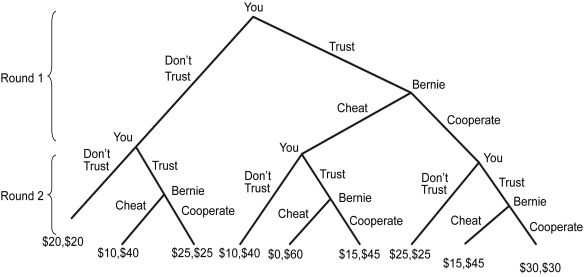Recall the trust game reported in the Evidence-Based Economics element in section 13.5.Consider the game where the trust game is played twice in succession.

Payoffs are the sum of payoff in each round.For example,suppose you choose Trust and Bernie chooses Cheat in the first round,then you choose Don't Trust in the second round (Bernie could choose either,because it does not get to his turn anyway).Then you earn $0 and Bernie earns $30 in the first round,and you earn $10 and Bernie earns $10 in the second round,so that your total payoff is $10 and Bernie's is $40.
a)Apply backward induction to this game.How do you and Bernie behave in the two-round version?
b)What would be the backward induction solution if the trust game is repeated three times? Four times? Twenty thousand times? Does this agree with what you read in the Evidence-Based Economics element in section 13.5?
Definitions:
Self-Concept
An individual's understanding of the self, comprising thoughts and feelings about personal abilities, appearance, and behavior.
Ethnocentrism
The belief in the inherent superiority of one's own ethnic group or culture, often accompanied by a disregard for other cultures.
Groupthink
A phenomenon within groups where the desire for harmony or conformity results in an irrational or dysfunctional decision-making outcome.
Prejudice
A preconceived opinion or judgment about someone or something that is not based on reason or actual experience, often manifesting as bias or discrimination.
Q9: What is signaling?
Q33: The entry of new firms into a
Q38: Refer to the scenario above.Does Pennsylvania have
Q75: Refer to the figure above.What is the
Q77: Refer to the scenario above.If Frank
Q103: Refer to the figure above.If the government
Q151: The market outcome in a duopoly with
Q163: A game is called a simultaneous-move game
Q184: Refer to the scenario above.According to the
Q250: A monopolistic competitor earns zero economic profits